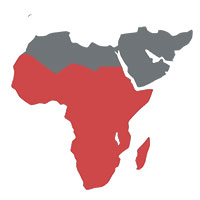EU’s Fast Financing of Africa
admin | December 1, 2011.
Least developed countries are faced with the need to adapt to climate change today, how is the global community assisting them?
It is a sad irony of climate change that the poorest countries have to bear its effects more than developed countries, who are the biggest contributors to global warming. The least developed countries (LDCs) are vulnerable to desertification, water shortage, droughts and the resulting famines. Furthermore they lack the capacity to adapt to climate change impacts. To support these countries, developed countries have pledged to provide almost €22 billion to developing countries in Copenhagen in 2009. The money is made available over a period of three years from 2010 to 2012, to enhance action on mitigation, adaptation, technology development and transfer and capacity building. It is called the ‘fast start financing initiative’ because it is a short term program aimed at projects that are quickly implementable. Approximately a fourth of the total cost for this initiative, was promised by the European Union. At COP17 in Durban, the EU gave an update on its compliance with this commitment.
 One of the programs sponsored by the EU through fast start financing is the Africa Biogas Partnership Program. Supported by the Dutch Government and the Netherlands Development Organisation (SNV), this project is aimed at providing ten million people in Burkina Faso, Ethiopia, Kenya, Senegal, Tanzania and Uganda with sustainable energy by 2015 through the installation of 70,000 small-scale biogas plants. One of those plants costs approximately 500 to 700 Euros and will reduce greenhouse gas emissions, improve the health and living conditions of those using the facilities and create jobs.
One of the programs sponsored by the EU through fast start financing is the Africa Biogas Partnership Program. Supported by the Dutch Government and the Netherlands Development Organisation (SNV), this project is aimed at providing ten million people in Burkina Faso, Ethiopia, Kenya, Senegal, Tanzania and Uganda with sustainable energy by 2015 through the installation of 70,000 small-scale biogas plants. One of those plants costs approximately 500 to 700 Euros and will reduce greenhouse gas emissions, improve the health and living conditions of those using the facilities and create jobs.
The €7.2 million provided by the EU for this project in 2011 is part of the total of €2.34 billion European states have provided this year. Together with the €2.34 billion mobilised in 2010, the EU has provided about two-thirds of its total commitment. After two, of three years, the EU is meeting their target. Given that it is a very difficult period for the European economy, this is quite remarkable news.
 Dr. Tewolde Berhan Gebre Egziabher, Director General of the Ethiopian Environmental Protection Authority, whose country receives funds from the initiative sees, however, remaining problems and challenges with fast start financing. Firstly, he believes the funds to be insufficient. “Will contributors stick to their promise, to increase transfers to developing countries to 100 billion dollars by 2020?,” he asks. Secondly, he criticises the bureaucracy needed to ensure accountability. “These requirements challenge countries that don’t have the capacity to deal with the bureaucracy. This leads to situations, where countries that need the money, can’t manage to even apply for the funds,” he says. The bureaucracy is, however, often very necessary, as Taulealeausumai Tuifuisaa Laavasa Maluafrom, part of the Samoan delegation emphasizes. As Chief Executive Officer of the Ministry of Natural Resources and Environment, he has worked with fast start financing money from the EU. “It is hard work, to make sure that the money from the EU really reaches the project and doesn’t get lost somewhere in the Ministry of Finance.”
Dr. Tewolde Berhan Gebre Egziabher, Director General of the Ethiopian Environmental Protection Authority, whose country receives funds from the initiative sees, however, remaining problems and challenges with fast start financing. Firstly, he believes the funds to be insufficient. “Will contributors stick to their promise, to increase transfers to developing countries to 100 billion dollars by 2020?,” he asks. Secondly, he criticises the bureaucracy needed to ensure accountability. “These requirements challenge countries that don’t have the capacity to deal with the bureaucracy. This leads to situations, where countries that need the money, can’t manage to even apply for the funds,” he says. The bureaucracy is, however, often very necessary, as Taulealeausumai Tuifuisaa Laavasa Maluafrom, part of the Samoan delegation emphasizes. As Chief Executive Officer of the Ministry of Natural Resources and Environment, he has worked with fast start financing money from the EU. “It is hard work, to make sure that the money from the EU really reaches the project and doesn’t get lost somewhere in the Ministry of Finance.”
The most persevering question concerning the EU’s fast start financing, however, is about the origin of the money. “How do I know, that this money is not from the ODA [Official Development Assistance] budget and has just been re-dubbed ‘fast start’?,” asks Dr. Tewolde. Arthur Runge-Metzger, Director for Climate Policy at the European Commission, reassures that the money is “new and additional.” “We took it out of the budget margin, the money that has not been assigned a specific purpose to be used in cases of urgency,” he says.
The fast start funding by the EU will end after 2012. Meanwhile countries like Australia and Japan have taken up the concept and provide similar finance to vulnerable countries. “Fast start is working, but this can only be the beginning,” Taulealeausumai Tuifuisaa Laavasa Maluafrom believes.
The negotiations at COP17 in Durban will show, if the Green Climate Fund will extend and the expand the money flow to projects like the Africa Biogas Partnership Program.













comment